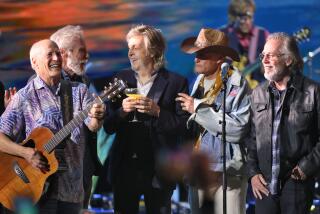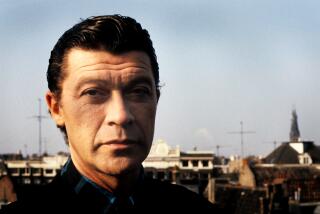POP MUSIC REVIEW : Robben Ford Proves He’s Up to Challenge of Trio Format
- Share via
SAN JUAN CAPISTRANO — His reputation as a blues guitarist got him into the Miles Davis band. Wednesday at the Coach House, Robben Ford showed that despite his jazz associations--he also was one of the original Yellowjackets--he intends to build his solo career on his blues ability as well.
His last album, 1988’s “Talk to Your Daughter” (Warner Bros.), utilized keyboards and saxophones to add a glossy, more pop-oriented sound to his music, but Ford has trimmed his performing band down to a trio. The smaller group puts the focus squarely on the guitarist, and Wednesday night Ford was easily up to the challenge.
Backed by bassist Roscoe Beck and drummer Tom Brechtlein (who recently has been heard with Lee Konitz and Charlie Haden as well as in Chick Corea’s Akoustic Band), Ford seemed relaxed and confident during a set of mostly original music pulled from the album.
The guitarist was clean (apart from a few tuning problems), crisp and imaginative, constructing coherent solos with narrative qualities rather than depending on an endless string of hot, impressive licks.
Not that Ford isn’t capable of making heated statements. His solo on “Born Under a Bad Sign” began quietly but terminated in blistering runs and strong, assertive chording. The wide variety of sounds Ford pulls from his guitar rivals those of an experienced alley cat: howling, snarling and spitting before breaking into a warm purr.
Ford’s use of shifting dynamics--something he probably learned from his former boss, Miles--was particularly impressive. Loud, assertive themes gave way to solos that were played at a whisper’s pitch. Volume would increase as improvisation progressed, sometimes returning to quiet understatement, other times swelling to a roof-raising climax.
Ford sings with the pleasant tones of a choir boy, and his voice succeeds best during slower, relaxed numbers. He communicates well within a rather narrow range. But his sound could use some toughness, some sign of the disappointment and hard times associated with the blues. Not as emphatic with a lyric as someone like Robert Cray, he makes up for his vocal limitations with those convincing, hard-edged guitar lines.
He doesn’t limit himself to the blues. His own “Help the Poor,” a soulful, steady rocker, featured the Spanish-tinged chords played over a bass line that recalled Michael Jackson’s “Billy Jean.” And Ford frequently made reference to tunes with jazz associations during the performance, moving in and out of “Surrey With the Fringe on Top” while soloing on “Nothin’ but the Blues,” and dropping hints of “Summertime” and Davis’ “So What” during his closing instrumental number.
Brechtlein and Beck provided solid support throughout, the drummer’s on-the-beat toms and driving bass pedal pushing the entire performance. Beck stuck to the lower ranges of his instrument, adding only an occasional embellishment and not taking a solo of his own. Both were alert to Ford’s shifts in volume, matching hushed tones with diminished responses, challenging loud passages with furies of their own.
Even more basic was Juke Logan and Bill Lynch’s opening set of classic blues and rock ‘n’ roll. Logan’s harmonica work (that’s him playing on the opening theme to “Roseanne”) is reminiscent at times of Paul Butterfield’s, and Lynch is a capable barroom guitarist.
What the two lack in vocal skills was overcome by their enthusiasm, and their rough-and-ready style seemed to fit perfectly in the room’s roadhouse decor.
Lynch’s guitar soloing was especially passionate during “God Bless the Child” and Logan played melodica during one number, getting a funky squeeze box sound. Search these two out when you’re looking for a good musical time.
More to Read
The biggest entertainment stories
Get our big stories about Hollywood, film, television, music, arts, culture and more right in your inbox as soon as they publish.
You may occasionally receive promotional content from the Los Angeles Times.










